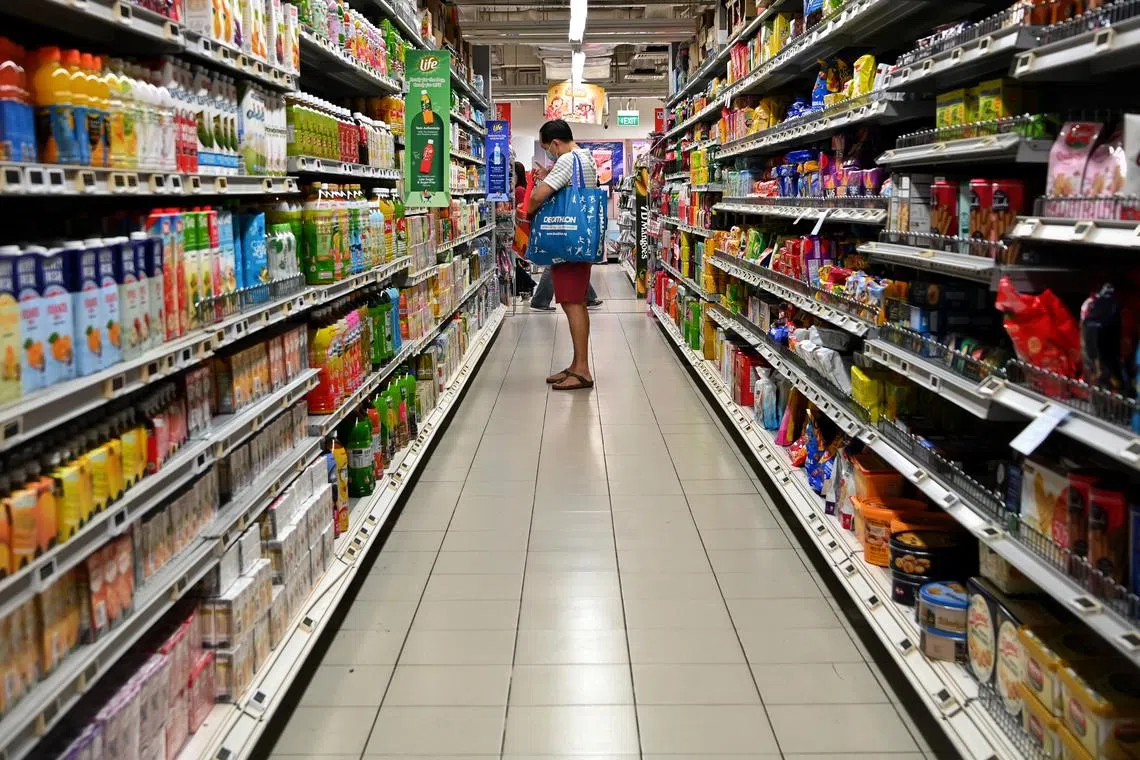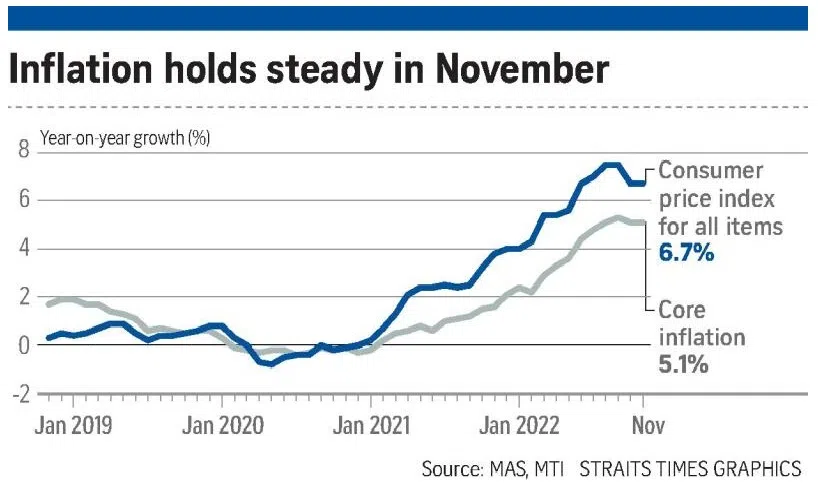Singapore core inflation unchanged in November at 5.1%; analysts see price rises stabilising
Sign up now: Get ST's newsletters delivered to your inbox

November’s headline consumer price index or overall inflation stayed flat from the previous month.
PHOTO: ST FILE
SINGAPORE – Core consumer prices in Singapore rose in November at a pace that was unchanged from the previous month, in what analysts say could be a sign that inflation is levelling off.
Core inflation, which excludes costs of private transport and accommodation and reflects the expenses of Singapore households more accurately, came in at 5.1 per cent year on year. This was in line with the 5 per cent expected by analysts in a Bloomberg poll.
The figure was unchanged from October,
Smaller increases in the costs of services, as well as electricity and gas, were broadly offset by a steeper pick-up in the costs of food, retail and other goods, the Monetary Authority of Singapore (MAS) and Ministry of Trade and Industry (MTI) said on Friday.
November’s headline consumer price index (CPI), or overall inflation, also stayed flat from the previous month, at 6.7 per cent, but it was slightly higher than the 6.5 per cent forecast by analysts.
Ms Selena Ling, OCBC Bank’s chief economist, said both inflation indicators are showing clearer signs of stabilisation after peaking in the later part of the third quarter.
“This should come as modest relief to MAS and dampen the need for any off-cycle move ahead of April’s scheduled monetary policy statement,” she added.
Singapore’s central bank has tightened monetary policy five times since October 2021 to allow for a stronger Singapore dollar to reduce imported inflation. Two of these moves were off-cycle, that is, ahead of a scheduled meeting.
MAS and MTI said on Friday that demand conditions in major economies have softened, while supply chain frictions continued to ease. Prices of energy and food commodities have come off the peaks reached earlier in 2022 but remain firm given ongoing supply constraints, they said.
“In addition, labour markets in major advanced economies are still tight, keeping wage pressures strong. Singapore’s imported inflation across a range of goods and services is expected to remain significant for some time.”
Overall inflation is expected to average around 6 per cent for the full year, while core inflation is projected to come in around 4 per cent, unchanged from MAS’ October forecasts.
For 2023, the overall inflation forecast is also unchanged at between 5.5 per cent and 6.5 per cent, with core inflation between 3.5 per cent and 4.5 per cent. These estimates take into account the upcoming increase in the goods and services tax.
Across the categories, electricity and gas inflation fell the most, to 16.7 per cent in November, down from 19 per cent in October.
This was partly due to a higher base a year ago, when some households whose Open Electricity Market (OEM) retailers had exited the market
Services inflation also eased, from 3.9 per cent in October to 3.6 per cent in November, owing to a smaller increase in airfares.
Accommodation inflation similarly edged down, from 4.9 per cent in October to 4.8 per cent the next month, as housing rents rose at a more gradual pace.
Private transport inflation slowed marginally, from October’s 17.3 per cent to November’s 17.2 per cent, in line with smaller increases in car and petrol prices. But food inflation rose from 7.1 per cent in October to 7.3 per cent in November as the costs of food services rose at a faster pace.
The cost of retail and other goods also rose more sharply at 3.3 per cent, compared with 2.6 per cent in October, due to steeper increases in the prices of clothing and footwear, personal care products, and medicine and health products.
Core inflation is expected to stay elevated in the next few quarters before slowing more discernibly in the second half of 2023 as the tight labour market here eases and global inflation moderates, said MAS and MTI.
Labour costs are expected to increase further in the near term alongside robust wage growth, while the cost of utilities will probably remain high. Firms will likely pass import, labour and other business costs to consumers amid resilient demand, they said.
Increases in car and accommodation costs are also expected to stay firm in the upcoming quarters amid tight certificate of entitlement quotas for cars
Barclays’ senior regional economist Brian Tan said November’s core inflation was stable despite rising underlying price pressures.
He said: “Actual core inflation will likely undershoot the MAS’ projections slightly in the fourth quarter of 2022. That said, we note the still-significant risk that policymakers choose to tighten (monetary policy) again early next year to pre-emptively quell any increase in inflation expectations arising from the goods and services tax rate hike, especially as underlying price pressures remain hot.”




